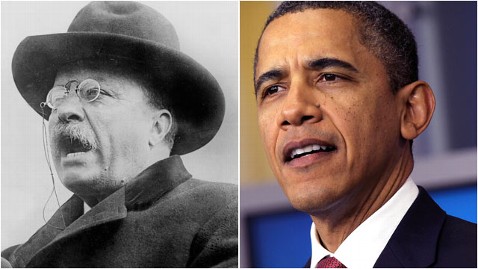Obama to Invoke Roosevelt’s ‘Square Deal’ in Rare Kansas Visit
 President Obama heads to the heartland today to claim the mantle of a popular Republican president in his latest push for a payroll tax cut compromise and a populist narrative for his re-election campaign.
President Obama heads to the heartland today to claim the mantle of a popular Republican president in his latest push for a payroll tax cut compromise and a populist narrative for his re-election campaign.
In Osawatomie, Kansas - population 4,500 - Obama will tout his proposed tax cut extension as a "square deal" aligned with the vision of economic fairness and equal opportunity espoused by former Republican President Teddy Roosevelt in the same town 101 years ago.
Roosevelt's "new nationalism" speech of 1910 laid out a sweeping progressive agenda for America that challenged his party and the federal government to raise taxes and ensure the welfare of workers.
"The optics give the president a chance to harken back to a popular historical figure, to look bipartisan in doing so, and perhaps to demonstrate that he isn't only traveling to states with electoral reward," said U.S. Naval Academy professor and presidential historian Brendan Doherty.
Kansas - a solid red state that hasn't voted for a Democrat in a presidential election since 1964 - is an unusual destination for Obama who has spent most of his time recently stumping in 2012 battleground states.
Moreover, it's also one of the least visited states by any president over the past 35 years. The last "six presidents collectively held events in Kansas on 15 days, the ninth lowest total for any state," Doherty said.
(Carter and George H.W. Bush visited Kansas only once during their presidencies. Ronald Reagan made three trips, while Bill Clinton made two. George W. Bush visited eight times.)
Obama's first trip as president underscores the White House effort to put Republicans on the spot, on their turf.
"How can you fight tooth and nail to protect high-end tax breaks for the wealthiest Americans and yet barely lift a finger to prevent taxes going up for 160 million Americans who really need the help?" Obama said Monday of Republicans opposing the tax cut extension. "It doesn't make sense."
While some GOPers have warmed to the idea of extending the existing payroll tax cuts, disagreement remains over how to pay for it. And the White House says the gridlock has put a potential $1,000 tax hike for the average American on the line by the end of the year.
Historians say the attempt to channel Roosevelt's mantra - casting Republicans as out of touch with their roots - is a deft one by the administration, especially headed into 2012.
"There is this question of fairness and equity and how do you deal with hard times in America, and the Republicans keep taking positions that make them vulnerable to attack that they don't think about fairness," said Princeton University political scientists Julian Zelizer of the debate over payroll tax cuts and unemployment insurance benefits.
The payroll tax cuts are "not a class issue, since they apply to everybody, and it allows Democrats to talk about liberal policies without easily falling into the trap of being left-wing socialists," Zelizer said. "It's an issue that resonates. Polls show Americans think about fairness, and historically talking about it has been a way that Democrats can do very well against Republicans."
But the comparison to Roosevelt, a progressive Republican whose views would be more in line with modern Democrats, isn't without flaws.
"The Osawatomie speech in 1910 epitomizes the radicalization of Teddy Roosevelt," said presidential historian Richard Norton Smith. "He was the opposite of bipartisanship; he was the forerunner of the Bull Moose Party. It's really the start of his renegade phase." (Nevermind that Roosevelt lost his bid for re-election in 1912).
The Republican National Committee has also blasted the comparison ahead of Obama's visit noting that Roosevelt chastised Washington politicians for broken promises - of which they say Obama has plenty.
"While Barack Obama may try to emulate Teddy Roosevelt, the American people have seen the current president fail to deliver on his promises and take us in the wrong direction on the economy, jobs, deficit, special interests getting special access and lobbyists running his administration," said RNC spokesman Joe Pounder.
(In Osawatomie, Roosevelt said, "No man is worth his salt in public life who makes on the stump a pledge which he does not keep after election; and, if he makes such a pledge and does not keep it, hunt him out of public life.")
Still, to Obama's audience the nuances of a figure who has become caricatured in American presidential lore, those distinctions might be easily lost.
"Except for the people who watch Fox News, TR is sort of this lovable, reassuring, entertaining, vaguely-inspiring figure that people identify with - his childhood struggles, the cowboy in North Dakota, the colorful charismatic person who represents in a broad ill-defined way by Republicans to adapt themselves to the new century."
And if that's their takeaway, historians say, Obama may very well be the one to gain.